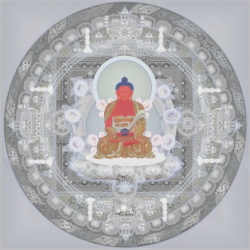Difference between revisions of "Knowledge of all aspects"
| Line 1: | Line 1: | ||
[[File:Tum7nal.JPG|thumb|250px|]] | [[File:Tum7nal.JPG|thumb|250px|]] | ||
| + | |||
| + | |||
| + | |||
'''[[Knowledge of all aspects]]''', or '''[[omniscience]]''' (Skt. ''[[sarvajñāna]]''; Tib. ''[[namkhyen]]''; [[Wyl.]] ''[[rnam mkhyen]]'') is the first of the [[eight topics]] of the ''[[Abhisamayalankara]]''. | '''[[Knowledge of all aspects]]''', or '''[[omniscience]]''' (Skt. ''[[sarvajñāna]]''; Tib. ''[[namkhyen]]''; [[Wyl.]] ''[[rnam mkhyen]]'') is the first of the [[eight topics]] of the ''[[Abhisamayalankara]]''. | ||
| + | |||
==[[Definition]]== | ==[[Definition]]== | ||
| − | [[Knowledge]] of all aspects (or [[omniscience]]) is defined as [[knowing]] directly, and in a single instant, all aspects, without exception, of things in their real [[nature]] and in all their multiplicity. | + | |
| + | [[Knowledge]] of all aspects (or [[omniscience]]) is defined as [[knowing]] directly, | ||
| + | |||
| + | and in a single instant, all aspects, without exception, of things in their real [[nature]] and in all their multiplicity. | ||
| + | |||
==Subdivisions== | ==Subdivisions== | ||
| + | |||
It can be subdivided into [[Two aspects of omniscience|two aspects]]: | It can be subdivided into [[Two aspects of omniscience|two aspects]]: | ||
| + | |||
| + | |||
{{:Two aspects of omniscience}} | {{:Two aspects of omniscience}} | ||
| − | An illustration of the former is the true [[cessation]] {{Wiki|present}} in the {{Wiki|continuum}} of the [[noble]] [[Buddha]]. The [[latter]] includes both the [[omniscience]] which [[knows]] the features of all [[knowable phenomena]] without exception, and the [[omniscience]] which [[knows]] the [[seventy points]], the chief amongst all [[causes]] and effects. | + | An illustration of the former is the true [[cessation]] {{Wiki|present}} in the {{Wiki|continuum}} of the [[noble]] [[Buddha]]. |
| + | |||
| + | The [[latter]] includes both the [[omniscience]] which [[knows]] the features of all [[knowable phenomena]] without exception, | ||
| + | |||
| + | and the [[omniscience]] which [[knows]] the [[seventy points]], the chief amongst all [[causes]] and effects. | ||
| + | |||
==Parameters== | ==Parameters== | ||
| + | |||
It is {{Wiki|present}} only in the {{Wiki|continuum}} of a [[noble]] [[Buddha]]. | It is {{Wiki|present}} only in the {{Wiki|continuum}} of a [[noble]] [[Buddha]]. | ||
{{RigpaWiki}} | {{RigpaWiki}} | ||
[[Category:Abhisamayalankara]] | [[Category:Abhisamayalankara]] | ||
Revision as of 05:03, 4 March 2016
Knowledge of all aspects, or omniscience (Skt. sarvajñāna; Tib. namkhyen; Wyl. rnam mkhyen) is the first of the eight topics of the Abhisamayalankara.
Definition
Knowledge of all aspects (or omniscience) is defined as knowing directly,
and in a single instant, all aspects, without exception, of things in their real nature and in all their multiplicity.
Subdivisions
It can be subdivided into two aspects:
- the omniscience which knows the nature of things (Skt. yathā; Tib. ཇི་ལྟ་བ་, Wyl. ji lta ba) and
- the omniscience which knows all things in their multiplicity (Skt. yāvat; Wyl. ji snyed pa).
An illustration of the former is the true cessation present in the continuum of the noble Buddha.
The latter includes both the omniscience which knows the features of all knowable phenomena without exception,
and the omniscience which knows the seventy points, the chief amongst all causes and effects.
Parameters
It is present only in the continuum of a noble Buddha.
